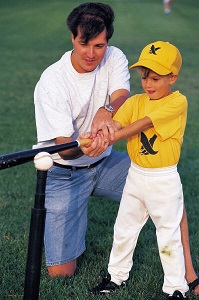 According to research, over the last few hundred years fathers have been less involved in passing on important information and wisdom to their sons. Each generation of fathers has shown that they have less authority over the last generation. Due to the fact that society has believed that raising children was women’s work and making money was a man’s job, to be a provider, fathers became too involved with their work and too busy to help raise healthy, well-adjusted sons
According to research, over the last few hundred years fathers have been less involved in passing on important information and wisdom to their sons. Each generation of fathers has shown that they have less authority over the last generation. Due to the fact that society has believed that raising children was women’s work and making money was a man’s job, to be a provider, fathers became too involved with their work and too busy to help raise healthy, well-adjusted sons
Our society has become confused with how to connect the old myth of the “too powerful father” with the longing for a father to be loving, nurturing and a teacher to his son. During the 1970s and 1980s, men experienced a shift in redefining fatherhood. They wanted to bond with their sons and spend quality time with their sons, rather than always emphasizing the importance of being successful in their careers. Parenting took on a new role and fathers participated in childbirth and parenting.
The term “Role-modeling” refers to the importance of how a father relates to his wife in terms of treating her with love and respect. If a young boy observes this behavior, then he will treat his mother with love and respect as well as other women in his life. If a boy observes his father objectifying women, showing lack of respect, and encounters domestic violence, then the son may role model the same behaviors during his childhood.
The way a father plays with his son is very different than the way a mother interacts with her son, developmentally. The research shows that fathers will play in a “rough-tumble” manner, where mothers will provide more of the nurturing, feeding, holding, and basic skills. If a father is involved in the birthing and caring of his newborn throughout his son’s development than a healthy bond will occur in the formative years. The way a father speaks to his son is also a key ingredient in how his son will feel about himself and his self esteem. Fathers who provide guidance, role modeling, fun activities, and spend nurturing and quality time with their sons will have a healthy relationship.
Some key parenting ingredients in raising your son may include:
- Learn to be an active listener with your son
- Try not to judge your son by using positive statements and affirmations, such as, “That’s a great idea,” or “I never thought about it from that perspective.”
- Celebrate and focus in on their day-to-day accomplishments. Example, putting a puzzle together, and making a positive statement like, “Wow, you figured that out quick!” to playing a fun sport with them, regardless of how well they are able to play.
 Keep your communication topics open. Allow your child to talk to you about many different subjects without being lectured or put down.
Keep your communication topics open. Allow your child to talk to you about many different subjects without being lectured or put down.- Set up special father-son bonding times together. Allow the child to pick his interest, instead of it always be the father’s.
- Start a project with your child. Something that is of interest to both of you.
- Attend your son’s extra-curricular activities as often as possible so he sees you and knows you care and support him. Attend parent-teacher meetings and conferences.
- Take a father-son trip together
- Text your son during middle school or adolescence with kind remarks and comments and let him know that you love him and you care.
- Don’t forget to hug your son, regardless of age.
- Tell your son how proud you are of him, for whatever small accomplishment it may be. It is critical that your son knows that you are proud of him throughout his development. Don’t just assume he knows.
Think back about your own relationship with your father, whether it was positive or negative. If you have not worked through your own issues, you may want to seek family counseling to guide you so that you break a pattern instead of repeating the same pattern with your own son. This can make a huge difference in your life and your personal relationship with your son throughout your lifetime together.

















